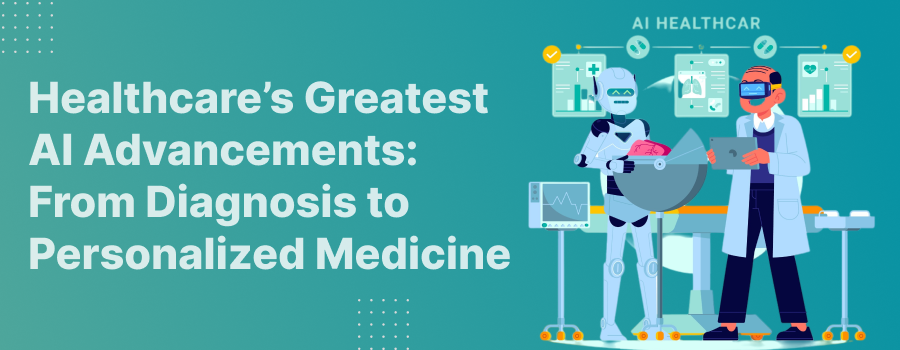Posted on: Sep 10, 2024
Estimated reading time: 0 minutes
Healthcare's Greatest AI Advancements: From Diagnosis to Personalized Medicine.

As 2024 draws to a close, AI's potential to completely transform healthcare is becoming more and more apparent. Personalized medicine, diagnosis, and treatment are the main areas of focus for this blog as it examines the most recent advancements in AI in the healthcare industry.
AI in diagnostics: quicker, more precise, and more easily accessed
The ability of AI to help with fast and accurate disease diagnosis is one of its greatest contributions. Conventional diagnosis frequently necessitates the interpretation of intricate medical data by specialists, such as MRIs and X-rays, which can be laborious and lead to human error.
Artificial intelligence (AI) alters that by precisely evaluating medical data and pictures.
Image Processing with AI: More early than ever before, AI algorithms can identify diseases like cancer, heart issues, and neurological disorders. As a result, physicians can begin treating patients earlier, improving the likelihood of a favorable result.
Availability: AI diagnostic tools are also being used in underserved and remote areas, providing previously unattainable advanced healthcare services to residents of these areas.
Personalized medicine: tailored therapies:
AI is assisting medical professionals in eschewing the "one-size-fits-all" approach to treatment.
By examining unique genetic information, lifestyle, and environmental factors, artificial intelligence (AI) enables personalized medicine as an alternative to treating all patients equally.
This aids medical professionals in creating personalized treatment regimens for each patient.
Genomic Assessment: AI can pinpoint the precise gene mutations causing a disease, like cancer, and recommend the best courses of action by examining a patient's genome.
The discovery of drugs: AI also contributes to the quicker discovery of new medications. As a result, patients with uncommon or challenging-to-treat illnesses will benefit from the faster development of more individualized pharmaceuticals.
Robotic Surgery: Minimum Recovery Time and Accuracy
AI is enhancing surgical procedures in addition to diagnosis and treatment. Robotic systems with artificial intelligence (AI) support surgeons by offering increased precision, which reduces complications and speeds up patient recovery.
Surgery with Artificial Intelligence: AI assists surgeons in performing more precise cuts and judgment calls. By modeling the process beforehand, it also aids in surgical planning.
Anticipating Future Health Issues with Predictive Analytics
AI is geared toward both illness prevention and treatment. AI is used in predictive analytics to evaluate patient data and determine the likelihood of developing chronic illnesses like diabetes, heart disease, and cancer.
Prevention in action: Physicians can recommend lifestyle modifications or early interventions to stop the disease from getting worse by early identification of high-risk patients. This lowers healthcare expenses while also saving lives.
Artificial intelligence and mental health care:
AI is being used to enhance mental health support using apps that offer early mental health disorder detection and real-time assistance.
Apps powered by AI: Users can instantly access therapy methods like cognitive behavioral therapy (CBT) with chatbots and AI-powered mental health apps. These resources contribute to the de-stigmatization of mental health and increase accessibility to care.
Early Detection: AI can identify early indicators of disorders like depression and anxiety, enabling prompt intervention, by analyzing speech patterns, social media behavior, and even facial expressions.
How does AI benefit healthcare?
AI’s impact on healthcare is vast, and its benefits include:
A quicker diagnosis: Because AI tools can evaluate data rapidly, physicians can identify illnesses and begin treating patients more quickly.
Individualized Assistance: AI enables the development of treatments that are specific to each patient, enhancing results and minimizing adverse effects.
Greater Accessibility: Particularly in underserved or rural areas, AI diagnostic tools are increasing healthcare accessibility.
Enhanced Accuracy: AI reduces the possibility of human error, producing more accurate outcomes.
Lower Health Care Costs: AI helps reduce health care costs by automating tasks and preventing diseases.
Conclusion:
Healthcare is being improved by AI, which is making it quicker, more precise, and more individualized.
Artificial intelligence is benefiting patients and medical professionals in a variety of ways, from early disease diagnosis to individualized treatment plans.
AI's continued development will only enhance healthcare delivery, paving the way for a more effective and universally available healthcare system in the future.